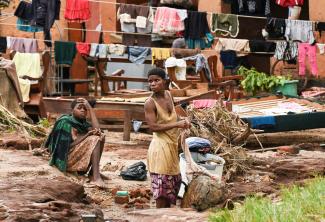Natural disasters
Consequences of cyclone Freddy
 picture-alliance/ASSOCIATED PRESS/Thoko Chikondi
picture-alliance/ASSOCIATED PRESS/Thoko Chikondi
More than one year has passed since cyclone Freddy struck Malawi, killing more than 1000 people and displacing hundreds of thousands. Yet the sound of the relentless rain that devastated the country and the scenes of desperate people fleeing for their lives still haunt us.
Social structures remain fractured. Many people are homeless and living in poverty. And while Malawi is still struggling with the effects of the cyclone, droughts are bringing new challenges. Cyclone Freddy was a stark warning of what is to come – more frequent and ferocious disasters driven by climate change.
The food supply is already inadequate: for many people, going to bed hungry has become the norm. Malawi cannot cope with this burden.
Women and girls have suffered the most from the cyclone’s impact. Existing inequalities were exacerbated. Women in Malawi face heightened risks of violence, exploitation and a lack of access to essential healthcare, including sexual and reproductive health services.
Child marriages and prostitution
While boys returned to school, many girls remain stranded in emergency shelters and are less likely to resume their education in the future. The catastrophe has destabilised entire communities and fuelled a rise in harmful practices likes child marriage. Those who have lost their families have little choice than to resort to transactional sex for basic necessities.
The emergency has also made basic health services inaccessible for many. Roads and bridges have been washed away. While healthcare workers did come to the camps, overcrowding and lack of privacy and individualised care make the situation more difficult. This applies in particular to gynaecological treatments, but also concerns the supply of contraceptives, for example.
One woman I met, a 25-year-old mother of two, was struggling to afford life-saving medication for her baby who was injured by a collapsing wall during the cyclone. I also spoke to a young HIV-infected girl who was moved back and forth between two camps, losing access to the medication she desperately needed.
Climate change and gender
The crisis emphasises an important fact: in the face of climate change, resilience and the strengthening of healthcare are crucial. In terms of feminist development policy, this must include sexual and reproductive health. Governments around the world must ensure that they can provide protection for women and girls when the next disaster strikes.
The disaster furthermore highlights why we need to accelerate the climate-justice agenda and ensure that the countries with the lowest carbon emissions do not bear the highest costs and consequences for people. This is why we need continuous and coordinated support from strong partners such as Germany and other industrialised nations.
Children and young people make up more than half of Malawi’s population. Their active participation in the search for long-term solutions is therefore essential. The same applies to the involvement of women.
My organisation “ALL for Youth” is supported by the Global Financing Facility for Women, Children and Adolescents (GFF) and is working in Malawi to close gaps here, among other things. The GFF, a country-led partnership hosted at the World Bank, supports 36 low- and middle-income countries in strengthening their health systems and promoting the health and rights of women and young people through more targeted measures and financing as well as political reforms.
Together with Côte d’Ivoire, the Netherlands and the World Bank, Germany is hosting the current GFF replenishment campaign. The aim of this campaign is to mobilise funds to provide 250 million women, children and young people with access to health services.
We now have the opportunity to learn the lessons of cyclone Freddy and build a more resilient and inclusive future. Only by working together can we create a world where no woman or girl is left behind. Ultimately, our future depends on this.
Christina Chilimba is the Founder and Executive Director of ALL for Youth, a youth-led organisation in Malawi.
christinachilimba15@gmail.com
